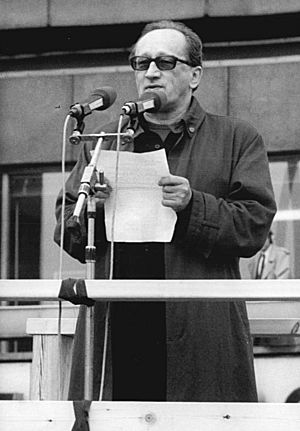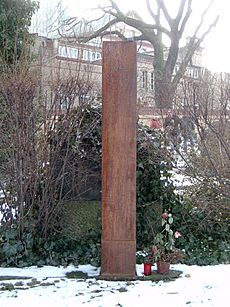Heiner Müller facts for kids
Quick facts for kids
Heiner Müller
|
|
|---|---|

|
|
| Born | 9 January 1929 Eppendorf, Saxony, Germany |
| Died | 30 December 1995 (aged 66) Berlin, Germany |
| Occupation | Dramatist Theatre director Dramaturg Poet Essayist Short story writer |
| Genre | Postdramatic theatre Non-Aristotelian drama Dialectical theatre Poetry Short stories Interviews |
| Literary movement | Postmodern Postdramatic theatre |
| Notable works | Hamletmachine The Mission Quartet |
| Spouse | Rosemarie Fritzsche (1951–1953, 1953–1954) Inge Müller (1954–1966) Ginka Tscholakowa (1967–1986) Brigitte Maria Mayer (1992–1995) |
Heiner Müller (born January 9, 1929 – died December 30, 1995) was a famous German writer. He was a dramatist (someone who writes plays), a poet, and a theatre director. His plays were often unique and sometimes puzzling. They made a big impact on modern theatre.
Contents
Heiner Müller's Life Story
Heiner Müller was born in a place called Eppendorf, in Saxony, Germany. In 1946, he joined a political party. This party later merged with another one. He was soon asked to leave because he wasn't enthusiastic enough.
In 1954, he became a member of the German Writers' Association. Müller became one of the most important playwrights in East Germany. He won important awards like the Heinrich Mann Prize in 1959 and the Kleist Prize in 1990.
Challenges with the Government
Müller's relationship with the East German government became difficult. His play The Resettler Woman was stopped after only one performance in 1961. He was also removed from the Writers' Association that same year.
The government continued to be cautious about Müller. They stopped his play Construction Site in 1965. They also censored his play Mauser in the early 1970s.
Gaining International Fame
Despite these problems, Müller's work became very popular. People in West Germany and other countries started to notice his plays. Many of his best-known plays were first performed outside East Germany. For example, Germania Death in Berlin was first shown in Munich in 1978.
Heiner Müller even directed his own play, The Mission, in Bochum in 1982. In Paris, his play Die Hamletmaschine (The Hamletmachine) had its first performance in 1979. His plays were also translated into English, helping him become known in English-speaking countries.
In 1976, Müller signed a petition with other artists. This petition was against the government's decision to remove a writer named Wolf Biermann from the country. Müller later withdrew his signature.
Later Life and Return to Favor
Because of his growing fame around the world, Müller was able to gain acceptance again in East Germany. He joined the East German Academy of Arts in 1984. He also became a member of the West Berlin academy two years later.
He was finally allowed back into the East German Writers' Association in 1988. This was shortly before East Germany changed. After the Berlin Wall fell, Müller became the last president of the East German Academy of the Arts.
In 1993, some questions were raised about Müller's past. He was asked about contacts he had with officials from 1979 to 1990. Müller said he had contact with these officials but never gave them any secret information.
In 1992, he was invited to join the leadership of the Berliner Ensemble. This was a famous theatre company started by Bertolt Brecht. In 1995, just before he died, Müller became the theatre's main artistic director.
In his last five years, Müller lived in Berlin and worked across Germany and Europe. He mostly directed his own plays. He didn't write many new plays during this time. However, he wrote a lot of poetry. He also worked on turning interviews into a type of literature.
Some of his well-known works include The Scab, Volokolamsk Highway, Despoiled Shore Medea Material Landscape with Argonauts, Philoctetes, Cement, Description of a Picture, and Quartet.
In 1994, he received the IV Europe Theatre Prize.
Heiner Müller passed away from throat cancer at age 66 in a Berlin hospital on December 30, 1995. He is buried in Berlin's Dorotheenstadt Cemetery. His grave was designed by his last stage designer, Mark Lammert.
Heiner Müller's Impact on Theatre
Even after his death, Müller continues to have a huge influence on playwriting and theatre in Europe. In 1998, a special issue of the journal New German Critique was dedicated to his work. He is the only playwright to receive such an honor. In 2009, a major publisher released the final volumes of his collected works.
Müller also inspired a new generation of theatre artists. These artists see themselves as "samplers." This means they use texts by others as material for their own work. Müller believed that the work of other writers was not private property. Instead, it could be used as raw material for new creations.
His theatre work led to a new style of playwriting. This style uses poetic language and connects ideas through association, rather than a simple, straight story.
A theatre critic, Jonathan Kalb, said that Müller's work changed theatre. He moved away from plays that taught a clear lesson. Instead, Müller created plays that were "open." These plays could have many meanings. They often felt dream-like, with characters and events moving between reality and dreams. The stage became a place where different ideas and quotes mixed together, outside of normal time and space.
Writer Tony Kushner said about Müller, "Write into the void... learn to embrace isolation... Forget about love and turn your face to history." For Müller, theatre was a way to explore history. It was like "a dialogue with the dead."
Awards and Honors
- 1959: Heinrich Mann Prize (with Inge Müller)
- 1964: Erich-Weinert-Medaille
- 1975: Lessing-Preis of East Germany
- 1979: Mülheimer Dramatikerpreis
- 1984: Karl-Sczuka-Preis (with Heiner Goebbels)
- 1985: Georg Büchner Prize
- 1985: Hörspielpreis der Kriegsblinden (with Heiner Goebbels)
- 1986: National Prize of the German Democratic Republic First Class for Art and Culture
- 1989: Hörspielpreis der Akademie der Künste (with Heiner Goebbels)
- 1990: Kleist Prize
- 1994: Europe Theatre Prize
- 1996: Theaterpreis Berlin (given after his death)
Major Works
Here are some of Heiner Müller's most important plays and works. The first date is when it was written, and the second is when it was first performed.
| Title in German | Title in English | Dates | Details |
|---|---|---|---|
| Zehn Tage, die die Welt erschütterten | Ten Days that Shook the World | (1957) | Co-written with Hagen Mueller-Stahl, based on John Reed's book |
| Der Lohndrücker | The Scab | (1958) | with Inge Müller |
| Die Korrektur | The Correction | (1958) | with Inge Müller |
| Die Umsiedlerin | The Resettled Woman | (1961) | |
| Der Bau | The Construction Site | (1965/1980) | |
| Sophokles: Oedipus Tyrann | Sophocles: Oedipus the King | (1967) | A new version of Sophocles' Oedipus Rex |
| Philoktet | Philoctetes | (1968) | A new version of Sophocles' play Philoctetes |
| Lanzelot | Lancelot | (1969) | Opera story (libretto) with Ginka Tsholakova for music by Paul Dessau |
| Prometheus | Prometheus | (1969) | Translation of a play believed to be by Aeschylus |
| Macbeth | Macbeth | (1971) | A new version of Shakespeare's play Macbeth |
| Zement | Cement | (1972/1973) | Based on a 1925 novel by Feodor Gladkov |
| Der Horatier | The Horatian | (1968/1973) | A play based on an old Roman story |
| Mauser | Mauser | (1970/1975) | A play that responds to Brecht's The Decision |
| Traktor | Tractor | (1974/1975) | A revised text first written between 1955 and 1961 |
| The Battle | The Battle: Scenes from Germany | (1974/1975) | A revised text first written in the early 1950s; a response to Brecht's Fear and Misery of the Third Reich |
| Germania Tod in Berlin | Germania Death in Berlin | (1971/1978) | Uses a unique, fragmented structure |
| Leben Gundlings Friedrich von Preußen Lessings Schlaf Traum Schrei | Gundling's Life Frederick of Prussia Lessing's Sleep Dream Scream: A Horror Story | (1976/1979) | |
| Die Hamletmaschine | The Hamletmachine | (1977/1979) | |
| Der Auftrag | The Mission | (1979/1980) | |
| Quartett | Quartet | (1981/1982) | Based on Laclos's novel Dangerous Liaisons |
| Verkommenes Ufer Medeamaterial Landschaft mit Argonauten | Despoiled Shore Medea Material Landscape with Argonauts | (1982/1983) | A version of the story of Medea using a fragmented structure |
| [in English] | the CIVIL warS a tree is best measured when it is down | (1984) | Part of the story for an opera by Philip Glass |
| Bildbeschreibung | Explosion of a Memory / Description of a Picture | (1984/1985) | A dream-like story, partly written automatically |
| Anatomie Titus Fall of Rome Ein Shakespearekommentar | Anatomy Titus Fall of Rome A Shakespeare Commentary | (1985) | A new version of Shakespeare's Titus Andronicus |
| [in English] | Description of a Picture or Explosion of a Memory | (1986) | An introduction to Robert Wilson's version of Alcestis |
| [in English] | Death Destruction & Detroit II | (1987) | Part of the story for an opera by Robert Wilson |
| Wolokolamsker Chaussee | Volokolomsk Highway | (1984–1987 / 1988) | A series of plays also known as The Road of Tanks |
| Hamlet/Maschine | Hamlet/Machine | (1989 / 1990) | Combines Shakespeare's Hamlet with Müller's own Die Hamletmaschine |
| Mommsen's Block | Mommsen's Block | (1992/1994) | A "poem / performance text" |
| Germania 3 Gespenster am toten Mann | Germania 3 Ghosts at Dead Man | (1995/1996) | Produced after his death |
Stage Productions Directed by Heiner Müller
Heiner Müller also directed many plays himself. Here are some of them:
- The Mission (Der Auftrag), in Berlin/East Germany, 1980–1983 (directed with Ginka Tscholakowa)
- The Mission (Der Auftrag), in Bochum, 1982 (directed with Ginka Tscholakowa)
- Macbeth, in Berlin/East Germany, 1982–1985 (Müller's own version of William Shakespeare's Macbeth; directed with Ginka Tscholakowa)
- The Scab (Der Lohndrücker), in Berlin/East Germany, 1988–1991 (this show also included Müller's The Horatian and Volokolomsk Highway IV, Centaurs)
- Hamlet/Machine (Hamlet/Maschine), in Berlin/East Germany, 1990–1993 (Müller's version of William Shakespeare's Hamlet combined with his own Hamletmachine)
- Mauser, in Berlin, 1991–1993 (this show also included Müller's Herakles 2 or the Hydra, Quartet, and Volokolomsk Highway V, The Foundling)
- Duell Traktor Fatzer, in Berlin, 1993–1996 (this show included Müller's Volokolomsk Highway III, The Duel, Mommsen's Block, and Tractor, plus his work on Brecht's Downfall of the Egotist Johann Fatzer)
- Richard Wagner's Tristan und Isolde at Bayreuth Festspielhaus 1993–1999 (conducted by Daniel Barenboim)
- Quartet (Quartett), in Berlin, 1994–1997
- Bertolt Brecht's The Resistible Rise of Arturo Ui (Der aufhaltsame Aufstieg des Arturo Ui), in Berlin, 1995–present
See also
 In Spanish: Heiner Müller para niños
In Spanish: Heiner Müller para niños
 | Selma Burke |
 | Pauline Powell Burns |
 | Frederick J. Brown |
 | Robert Blackburn |


